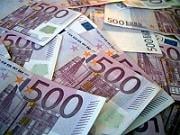500
Organised crime fears cause ban on 500 euro note sales
 Exchange offices in the UK have stopped selling 500 euro banknotes because of their use by money launderers.
Exchange offices in the UK have stopped selling 500 euro banknotes because of their use by money launderers.
The Serious Organised Crime Agency says 90% of the notes sold in the UK are in the hands of organised crime.
Soca deputy director Ian Cruxton said 500 euros had become the currency of choice for gangs hiding their profits.
The move means nobody will be able to buy the note in the UK - but travellers will be able to sell them if they enter the UK carrying them from abroad.
There has been mounting international concern over the note, which is worth more than £400, and its use by criminals or tax evaders.
Massive sums
Soca says that an eight-month analysis of movements of the note in the UK revealed that it was almost exclusively used by money launderers shifting cash for major crime gangs.
The British trade in the notes is thought to be worth some 500 million euros - but less than 10% of them are bought by legitimate tourists and business travellers. Financial crime investigators concluded that there was no credible or legitimate use for the note in the UK.
Instead, gangs are reportedly shifting massive sums of sterling, typically from drug dealing, through "front" exchange businesses.
Ian Cruxton, deputy director of Soca, told the BBC that the banknote had been secretly withdrawn from sale on 20 April.
"When criminals want to move a bulk of cash inside the UK and, more importantly, out of the UK, one of the best ways to do that is to reduce the bulk massively both physically and in terms of the risks they pose of discovery," said Mr Cruxton.
"The 500 euro note is really the note of choice among criminals.
"It should now be impossible now to buy a 500 note over the counter from one of the suppliers. And that's going to have an effect on the criminals - it means they are going to have to find other means of trying to move their money."
There have been widespread concerns among law enforcement agencies over the role of the 500 euro in money laundering, concerns that are identical to those raised about other similar high-value notes around the world.
The European Central Bank created the note at the time of monetary union to replace high value notes which were popular in some of the Eurozone countries.
(Published by BBC – May 13, 2010)